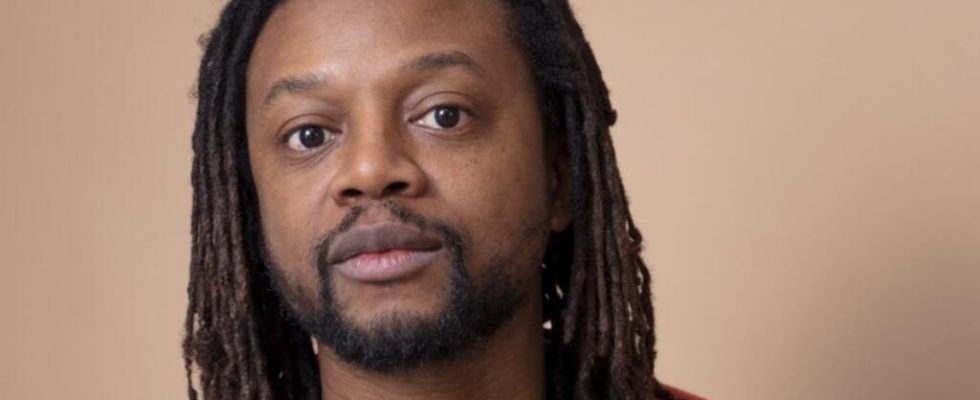My two dads is Eric Mukendi’s first novel. French teacher in Rouen, this primo-novelist tells us with a real talent as a storyteller the fortunes and misfortunes of immigration and the double culture through the story of the teenager Boris, torn between his two dads, but also between the chastised language of his Parisian lover and the mixed language of the suburbs, between Africanity and Frenchness. An eminently promising start.
Eric Mukendi was born in the Democratic Republic of Congo. He was 7 years when his family left the DRC to settle in France. The family fled the disorder and violence of the Mobutu years to rebuild their lives in other places. After living for a year in Mantes-la-Jolie, in the suburbs of Paris, the family settled in Normandy. It is in Louviers, country of Pierre Mendes France and not far from Rouen, where the future novelist grew up.
Forty years have passed since then, but the writer has not forgotten his first steps in Europe, the passage through the Parisian suburbs where he located most of the action of his first novel. ” I remember very well… We arrived via Belgium, via Brussels. I know we drove a lot, we had to cross the border, I don’t know how, but we had to cross it to get here. We weren’t in Schengen yet, because it was in 1984-1985. I remember very well the change, the cold, Mantes-la-Jolie… »
“Everything is true, everything is false at the same time”
In the Congo, little Éric already jabbered a few words of French, but it was in France that he learned the language of Voltaire, which he now teaches in Rouen, after having been a language and literature teacher in the Paris region. , but also in French high schools in Africa. My two dads is his first novel. Its hero, Boris, also comes from immigration, just like the author, but this novel is not however an autobiographical book, warns Eric Mukendi.
And to add: In the book, everything is true, everything is false at the same time. It means that if it didn’t happen to me, it happened to people I know. I would say it’s not autobiographical in the sense that I didn’t have two dads, but I may know people who have been through that. Everything is a little true and everything is a little false, as literature is supposed to do, the famous “lie-true “.
My two dads strikes by its maturity of writing, the control of its narration, the economy of means and a consummate sense of rising in tension, qualities which one rarely finds in a first novel. A story of education in the context of life in the Parisian suburbs, between unemployment and frustration, Éric Mukendi’s novel tells of a teenager’s learning of freedom and the complexities of the world. We think of Words of Sartre or man’s age by Michel Leiris featuring children setting out to conquer the world and learning about society through tears.
Boris’ situation is a bit more complex, because the boy has two dads. He has a biological father and his paternal uncle who took him into his home in France with his French wife and raised him as the son they did not have. Boris calls his uncle Fulgence dad and his aunt Beatrice mom, who, moreover, does not know that the teenager is not her husband’s son. The drama erupts when Daniel, Boris’ real dad arrives in France and knocks on his brother’s doors. With subtlety and sophistication, the novel depicts the adventures of life through which the young hero narrator becomes aware of his complex, unprecedented family situation and integrates it into his software. This will not happen without outbursts of voices, tears and anguish.
A sentimental education
In the pages of My two dads, social and moral education is coupled with sentimental education. During a school trip to the museum, Boris meets Hortense. Hortense is Parisian, from the bourgeoisie and lives in the city center in an apartment with a terrace, overlooking the Eiffel Tower. The current flows between the two, despite their social and cultural differences. It is above all their languages, markers of social landmarks, that distinguish them. Language becomes a social and sentimental issue, as the author explains through the voice of Boris, his fictional double: ” We were last night at the theater, it was amazing! » Hortense, she says these kinds of sentences and it rings true. You can tell she doesn’t say that to make fun of people who talk that way. […] it’s just that she remains herself, that she talks like that. That’s why I talk to him like you talk to friends, mixing slang, Arabic, hometown words, gypsies, I don’t know… it’s funnier that way. The language of the neighborhood is a French dish and at home everyone adds their spices or redoes it with their own sauce. It gives taste when we speak. To dare to use another metaphor in relation to our biology classes, I would say that our French is exogamous to us, whereas that of people from upmarket neighborhoods is completely inbred. The turns of phrase and words there are dry, out of juice, and kept artificially alive. And yet, I liked being in contact with this language when it was Hortense who spoke it. »
The excerpt above sets the tone of this book, torn between satire and sentiment. Entering literature through the great door of reading, Mukendi has read everything, in particular from the American Philippe Roth and the South African John Michael Coetzee, his models in writing. My two dads touches us because he knew how to make his own the uncompromising lucidity of the author of Disgrace and American outspokenness.
My two dads, by Eric Mukendi. “Dark Continents” collection. 181 pages, €18.50.
